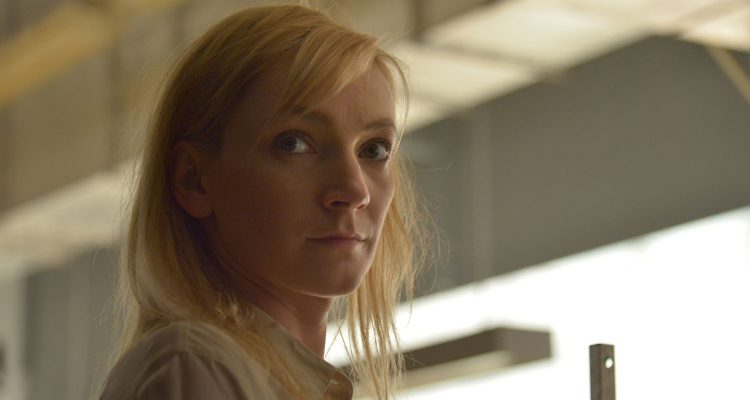Love, the books and songs have taught us, can flourish in the unlikeliest of environments — in a cold climate, in a time of cholera, in an elevator. But the love story at the heart of Hungarian director Ildikó Enyedi‘s poker-faced, prickle-hearted eighth feature (she won the Cannes Camera d’Or for her debut, “My Twentieth Century” back in 1989) may have all of them beat: it takes place in a Budapest abbatoir. A study in diametric contrasts, it is also probably the only tender, tentative movie romance also to feature an oddly compassionate yet completely graphic scene of modern, industrial cow slaughter.
For vegetarians, or those meat-eaters who find it hard to connect the plastic-wrapped cuts of steak in the refrigerated aisle to a real animal with dark, lash-fringed eyes and breath snorting through flaring nostrils, the sequence might be too much. But for the rest of us, there is a strange, cool fascination in watching the process — impersonal but not callous — whereby livestock becomes dead meat. They were doubtless going to be anyway, but animals were most definitely harmed in the making of this motion picture.
This sets up, with literally visceral impact, the “body” part of Berlinale Golden Bear winner “On Body and Soul“; the metaphysical aspect is gradually revealed as existing between two casual acquaintances: Endre (played with saturnine decency by Géza Morcsányi, a Hungarian playwright and translator in his first acting role) and Maria (Alexandra Borbély in a terrifically watchable, watchful turn). Endre is the slaughterhouse’s hollow-cheeked, soft-spoken financial director, afflicted with a withered arm, who is seen early on berating a prospective hire for not displaying any sympathy for the animals they’re in the business of killing. Maria is a much younger, wide-eyed, unsmiling introvert whose dissociative awkwardness, perfect recall and obsessive-compulsive behavior (replaying interactions word-for-word using salt cellars) suggest she’s somewhere on the spectrum. She is a newly joined meat quality inspector, who quickly alienates her chatty cheerful co-workers with her stickler’s regard for the rules, down to the merest millimeter.
When a cache of “mating powder” is stolen from the dispensary and used (sadly, offscreen) to enliven a seniors’ party, an attractive psychotherapist (Réka Tenki) with a comically deadpan fixation with the sexual, is brought in to determine who the wrongdoer is. In the course of the employee interviews, though, it emerges that Endre and Maria, who thus far have hardly spoken, have been dreaming the same dreams. The therapist, unnerved but assuming they’ve teamed up to play a joke on her, brings them together to hear each other’s session recordings and that’s how they discover that Endre is the stag with whom Maria, as a doe, nuzzles in a snowy forest each night.
This makes sense of the beautifully shot cervine interludes of the animals wandering through quiet white woods, amid an evocative soundscape of far-off gurgling streams, the ticking of snow-laden leaves and branches, and the patter and squeak of hoofs on a fresh fall. But it makes no actual sense at all, and in response to the tiny, useless miracle occurring between them, Maria and Endre hesitantly draw closer, despite her paralysing shyness and his self-conscious restraint. And of course these shared dreams provide an ethereal, pastoral contrast not just to the business of butchery, but to Maria and Endre’s sterile, lonely home lives and the banality of their co-workers’ chatter and bonhomie, from “rooster in the henhouse” new-guy Sandor, to the henpecked colleague with whom Endre usually lunches in the bright, clattery canteen.
The film evolves into a surprisingly touching metaphor for the randomness and helplessness of falling in love, which is, after all, part of its appeal. And whenever it’s in danger of becoming too precious, Enyedi provides us with a moment of black humor or some other, forensically unsqueamish proof that she is anything but precious. From the steaming insides of a freshly-decapitated cow head, to a fainting police officer, to an investigating detective who can be bought off with steak, to the two times we’ll watch blood spurt grotesquely from an artery and sluice across a clinical white floor (only once will it be from an animal) the film, rooted in those two wonderfully sure but quiet performances, somehow negotiates these vast disparities in tone. And so it doesn’t feel like it lurches from fantasy to comedy to melodrama to romance, but that it encompasses all these forms, and yet manages to retain a thrillingly simple purity.
“Forgive me, Hera” croons Laura Marling brokenly on the soundtrack (her plangent song “What He Wrote” is perhaps a tiny bit overused). And the uncanny crux of Enyedi’s lovely/nasty slice of abattoir whimsy does indeed remind one of Greek mythology. Plato gave an account of an ancient story involving Hera’s brother-husband Zeus, who got so jealous of these perfectly happy, threateningly powerful “humans,” who had four legs and four arms and two faces, that he split them down the middle and scattered them across the earth, so that they’d be condemned to spend their lives in search of their other halves. “On Body and Soul” imagines an unlikely scenario, yet one that possibly occurs to many people who fall madly and completely in love, that somehow they have beaten those astronomical odds and found their other half. Perhaps there is just one cosmic soulmate with whom one’s destiny is ineffably entwined, and in this case, they’re sitting in a chair a few yards away in a Budapest slaughterhouse, while stunned cattle are sliced open and skinned in the rooms beyond. [A-/B+]

